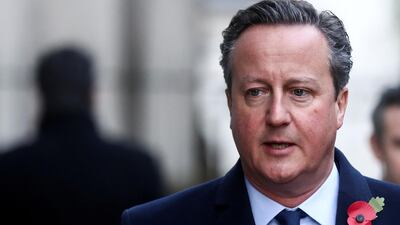Former UK prime minister David Cameron broke his silence over the controversy of his lobbying for Greensill Capital, defending his actions and saying he was right to contact the Finance Ministry.
“I thought it was right for me to make representations on behalf of a company involved in financing a large number of UK firms,” Mr Cameron told PA.
“This was at a time of crisis for the UK economy, where everyone was looking for efficient ways to get money to businesses.”
Mr Cameron and government ministers have come under fire in recent weeks for their connections to Greensill, which specialised in financing supply-chain invoices but collapsed last month.
Mr Cameron, an adviser to the firm, had lobbied the Chancellor of the Exchequer, Rishi Sunak, to give Greensill access to Britain’s pandemic support programme.
He also arranged a private meeting with Health Secretary Matthew Hancock, after which a Greensill payment programme was used in the National Health Service, The Sunday Times reported.
But Mr Cameron did say there were “important lessons” to be learnt about how former ministers and prime ministers interact with the government.
He said communications should be “through only the most formal of channels so there can be no room for misinterpretation".
“In my representations to government, I was breaking no codes of conduct and no government rules,” Mr Cameron said.
“The Registrar of Consultant Lobbyists has found that my activities did not fall within the criteria that require registration.”
Why seagrass matters
- Carbon sink: Seagrass sequesters carbon up to 35X faster than tropical rainforests
- Marine nursery: Crucial habitat for juvenile fish, crustations, and invertebrates
- Biodiversity: Support species like sea turtles, dugongs, and seabirds
- Coastal protection: Reduce erosion and improve water quality
UAE currency: the story behind the money in your pockets
The schedule
December 5 - 23: Shooting competition, Al Dhafra Shooting Club
December 9 - 24: Handicrafts competition, from 4pm until 10pm, Heritage Souq
December 11 - 20: Dates competition, from 4pm
December 12 - 20: Sour milk competition
December 13: Falcon beauty competition
December 14 and 20: Saluki races
December 15: Arabian horse races, from 4pm
December 16 - 19: Falconry competition
December 18: Camel milk competition, from 7.30 - 9.30 am
December 20 and 21: Sheep beauty competition, from 10am
December 22: The best herd of 30 camels
Volunteers offer workers a lifeline
Community volunteers have swung into action delivering food packages and toiletries to the men.
When provisions are distributed, the men line up in long queues for packets of rice, flour, sugar, salt, pulses, milk, biscuits, shaving kits, soap and telecom cards.
Volunteers from St Mary’s Catholic Church said some workers came to the church to pray for their families and ask for assistance.
Boxes packed with essential food items were distributed to workers in the Dubai Investments Park and Ras Al Khaimah camps last week. Workers at the Sonapur camp asked for Dh1,600 towards their gas bill.
“Especially in this year of tolerance we consider ourselves privileged to be able to lend a helping hand to our needy brothers in the Actco camp," Father Lennie Connully, parish priest of St Mary’s.
Workers spoke of their helplessness, seeing children’s marriages cancelled because of lack of money going home. Others told of their misery of being unable to return home when a parent died.
“More than daily food, they are worried about not sending money home for their family,” said Kusum Dutta, a volunteer who works with the Indian consulate.
Director: Laxman Utekar
Cast: Vicky Kaushal, Akshaye Khanna, Diana Penty, Vineet Kumar Singh, Rashmika Mandanna
Rating: 1/5
Some of Darwish's last words
"They see their tomorrows slipping out of their reach. And though it seems to them that everything outside this reality is heaven, yet they do not want to go to that heaven. They stay, because they are afflicted with hope." - Mahmoud Darwish, to attendees of the Palestine Festival of Literature, 2008
His life in brief: Born in a village near Galilee, he lived in exile for most of his life and started writing poetry after high school. He was arrested several times by Israel for what were deemed to be inciteful poems. Most of his work focused on the love and yearning for his homeland, and he was regarded the Palestinian poet of resistance. Over the course of his life, he published more than 30 poetry collections and books of prose, with his work translated into more than 20 languages. Many of his poems were set to music by Arab composers, most significantly Marcel Khalife. Darwish died on August 9, 2008 after undergoing heart surgery in the United States. He was later buried in Ramallah where a shrine was erected in his honour.


